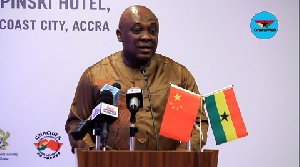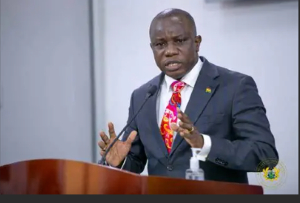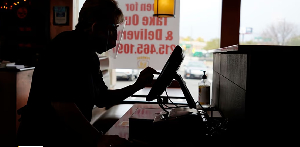The Ghana Institute of Freight Forwarders (GIFF) has come under fire for its opposition to the yet-to-be launched UNIPASS, which, unlike the current system, would maximize revenue and facilitate trade processes in the country without hitches.
Deputy Minister of Trade and Industry, Carlos Ahenkorah and the Chamber of Freight and Trade have on separate platforms, spiritedly defended why the UNIPASS deal has come to stay, with the deputy minister going further to fault GIFF, which himself is a member, for not seekingclarification on issues before hurriedly organizing a press conference to condemn the deal.
The Deputy Minister quizzed the Freight Forwarders when he walked in their press conference last Monday, unannounced, that “I want to ask the President of GIIF. Did you approach the Ministry of Trade to find out answers to this questions? I expect that if he has questions, he could be walk to my office.
In this case, I have not been contacted, my Minister has not been contacted but GIIF has come out with a position and for me I think it is a bit wrong. If you have questions, you come to us”.
Why the UNIPASS deal will come to pass come rain or shine, the minister inferred was that “For some time now, revenue targets are not being met and as a privileged member of the board of GRA there are so many interventions that we are bringing up (UNIPASS included) on board which I don’t have the mandate of my board chairman to spill out here to as it were unmet the collection of revenue so as to assist the government in developing our nation.”
Hon Carlos Ahenkrah indicated that Government’s interest was not in GCnet or Westblue. “Our interest is in the Ghanaian importer. My paperless report was geared towards reducing the cost of doing business in the port. We don’t have anything against GCnet and WESTBLUE but we have everything against not maximizing revenue collection or implementing appropriate trade facilitation methodology. Now if we display paperwork indicating the percentages that goes to companies, how many people understand or know that?”
There is no doubt about the fact that everyone has an emotional attachment to GCnet and Westblue when you go to the port. Prior to our coming to power, there was a serious turf war between these two companies. These two companies were not communicating and the reason was that the SLA license for GCnet is a bit higher than that of WESTBLUE and in the IT world, if you don’t have your licenses on the same platform, there is no way you can compete.
When you do that, other agencies outside will not respect the higher grade that has joined the smaller grade because it is always very tricky, the minister intoned and inferred that, that was why UNIPASS was coming in to remedy the situation.
Subsequent to a press conference, where Kwabena Ofosu-Appiah, President of GIFF, opined that government decision to bring onboard UNIPASS was a chaotic and suicidal one, its mother agency, the Chamber of Freight and Trade, has lend it full forward to the new revenue collection system.
President of the Chamber of Freight and Trade, Dennis Amfo Sefah, in a press release yesterday stated categorically that “We wish to state categorically that as a Chamber we are in full support of the UNIPASS. Currently Importers pay 1% of CIF as CCVR fee to West Blue and 0.4% on FOB to GCNet as network Charge a total of 1.4% which adds up to the cost of doing business in our country's Ports.”
The statement explained that Government in its e?orts to reduce the cost of doing business was partnering the Korean Government to roll out UNIPASS which would execute the job West Blue and GCNet does at a cheaper cost of 0.75%, more e?ectively and e?ciently, to bring some relieve to the Ghanaian importer.
“We are solidly behind Government in its quest to ?nd solutions to the high cost of doing business in our ports,” Dennis Amfo Sefah assured.
The Chamber of Freight and Trade statement dwarfs GIFF’s assertion that the UNIPASS system would be 0.75 percent of Free on Board (FOB) compared to the combined fee of GCNET (0.40 percent of FOB) and Westblue (0.28 percent of CIF) which sums up to 0.68 percent in simplistic terms.
Business News of Thursday, 31 May 2018
Source: Ernest Addo













